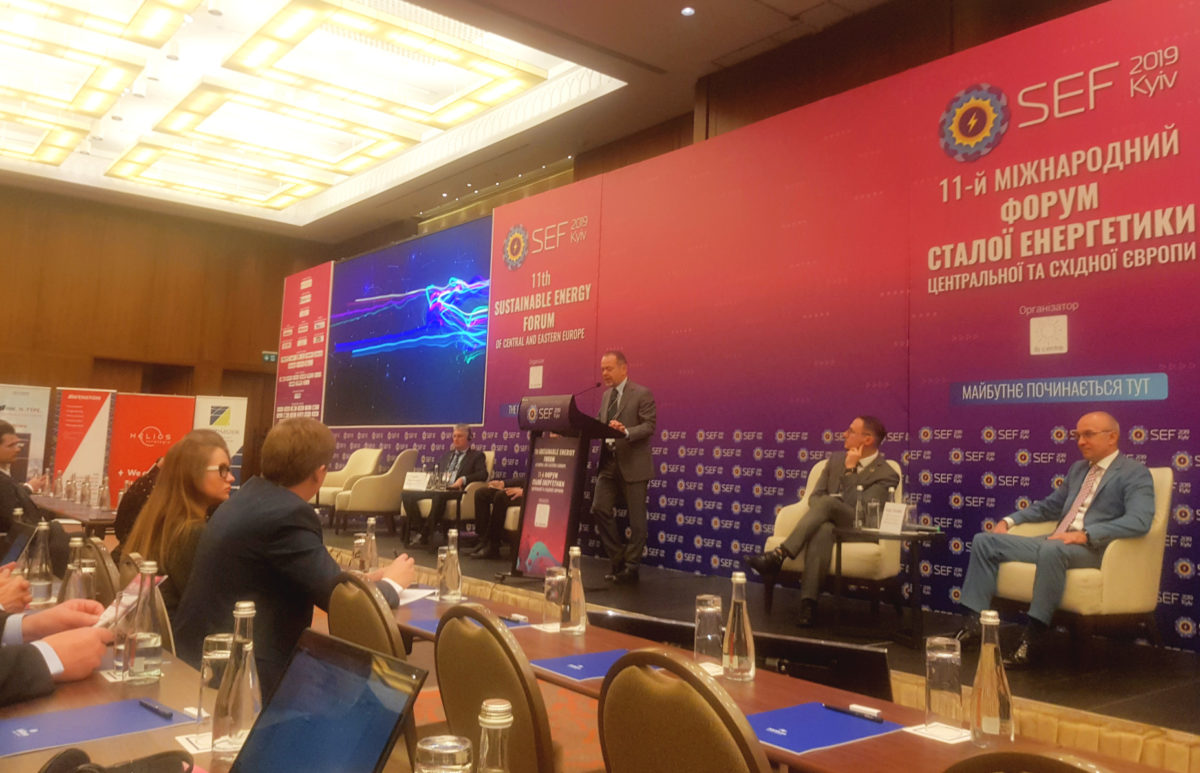Despite sunny skies and unseasonably warm mid-October temperatures in Kiev this week, Vitaliy Tymoshchenko, CEO of Ukrainian engineering, procurement and construction company Blockmaster said he feared gloomy clouds would soon shadow the city.
Tymoshchenko wasn’t talking about the weather so much as the potential impact of continuing reforms to Ukraine’s renewable energy law. The country has been at a green energy crossroads for a good nine months now. The overriding sentiment at this year’s Sustainable Energy Forum (SEF) – held in Kiev this week – was that the country still lacks a clear strategy and legislation for its clean energy ambitions.
The three-day conference, which concluded yesterday, saw attendees talk with pride of the strides made in renewables to date but also voice concern about what lies ahead.
In May, Ukraine adopted a new renewable energy law to move away from a €0.1502/kWh feed-in tariff towards a competitive auction system. The new regime will apply unless a project can qualify for a pre-power purchase agreement (pre-PPA) by signing an electricity offtake deal to reach commercial operation within two years. The FIT is set for gradual reductions to reach €0.0975/kWh for power plants commissioned in 2025.
Auction regime
Renewables capacity procurement auctions will start next year and be held twice annually. The system will be overseen by new government agency “Guaranteed Buyer”, which will also buy the energy generated, through PPAs. Konstyantyn Petrykovets, director of the agency, used his time on stage to present a 100%-performance-on-payment due diligence exercise to assure international investors. Since its inception this year, the agency has already signed 468 PPAs related to project generation capacity of 1.9 GW.
Rumors abounded during the conference of possible retroactive cuts to FIT payments. The effect could be hard felt as the outlook of ending FITs prompted a Vietnam-like solar gold rush to take advantage of the soon-to-expire fixed incentive. Last year, Ukraine had 1 GW of solar generation capacity. This year it could approach 3 GW, according to Hamlet Tunyan, CEO of module maker Recom and his counterpart at Ukrainian rival Kness, Sergiy Shakalov.
Popular content
It is just that sort of surge in solar capacity – and attendant incentives bill for the government – which is prompting fears of subsequent forced FIT reductions. Philipp Leckebusch, CEO of Kiev-based developer DTEK Renewables, tweaked his planned presentation to warn about the dangers of such retroactive moves as witnessed by Spain’s move to retroactively cut the FIT, in 2013.
Retroactive FIT cut fear
“Government representatives said that there were some conversations that they will cut the FIT completely,” said Narek Tunyan, head of business and legal affairs at Recom, “but on [the] Wednesday before SEF, the head of the parliamentary committee on energy said that they are not going to make a risky cut of the feed-in tariff because it will destroy all of the market. Instead, they will negotiate with all market participants to find the best decision for everybody: The government, the state and investors in Ukraine. I don’t think they will make the cut to the FIT at all because it will really destroy the Ukrainian market for many years.”
Despite the FIT-related anxiety, the show also exhibited an air of optimism. Ukraine aims to raise the 3.7% slice of its energy mix currently supplied by renewables to 11% by 2022 and 25% by 2035. To achieve those aims will require a lot of new capacity even if the expected 3 GW solar market anticipated by some this year is not expected to continue under the auction commissioning process.
“If there are no dramatic changes it will be around 1-2 GW,” said Recom chief executive Tunyan. “We have supplied 300 MW [to Ukraine] since late 2015, when we entered the market, and we have contracted another 250 MW until the first quarter of next year.”
Similarly, Kness’ Shakalov and DTEK’s Leckebusch reiterated their faith in the Ukrainian market. Industry insiders expect the details of the new renewables regime to be ironed out within weeks. After that, to return to Tymoshchenko’s meteorological metaphor, “the dark cloud will pass eventually”.
This content is protected by copyright and may not be reused. If you want to cooperate with us and would like to reuse some of our content, please contact: editors@pv-magazine.com.



1 comment
By submitting this form you agree to pv magazine using your data for the purposes of publishing your comment.
Your personal data will only be disclosed or otherwise transmitted to third parties for the purposes of spam filtering or if this is necessary for technical maintenance of the website. Any other transfer to third parties will not take place unless this is justified on the basis of applicable data protection regulations or if pv magazine is legally obliged to do so.
You may revoke this consent at any time with effect for the future, in which case your personal data will be deleted immediately. Otherwise, your data will be deleted if pv magazine has processed your request or the purpose of data storage is fulfilled.
Further information on data privacy can be found in our Data Protection Policy.